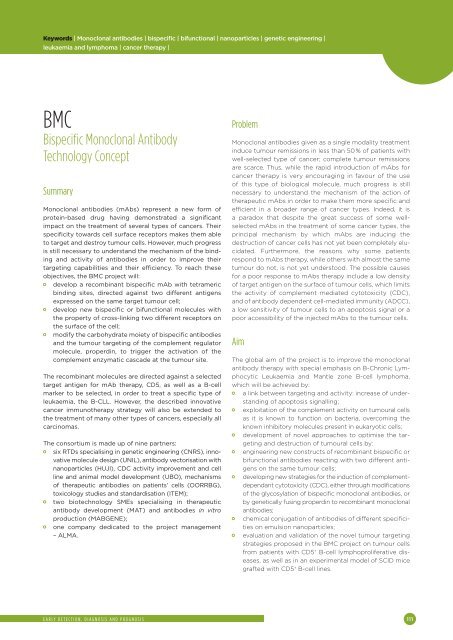You also want an ePaper? Increase the reach of your titles
YUMPU automatically turns print PDFs into web optimized ePapers that Google loves.
Keywords | Monoclonal antibodies | bispecifi c | bifunctional | nanoparticles | genetic engineering |<br />
leukaemia and lymphoma | cancer therapy |<br />
BMC<br />
Bispecifi c Monoclonal Antibody<br />
Technology Concept<br />
Summary<br />
Monoclonal antibodies (mAbs) represent a new form of<br />
protein-based drug having demonstrated a signifi cant<br />
impact on the treatment of several types of cancers. Their<br />
specifi city towards cell surface receptors makes them able<br />
to target and destroy tumour cells. However, much progress<br />
is still necessary to understand the mechanism of the binding<br />
and activity of antibodies in order to improve their<br />
targeting capabilities and their effi ciency. To reach these<br />
objectives, the BMC project will:<br />
• develop a recombinant bispecifi c mAb with tetrameric<br />
binding sites, directed against two diff erent antigens<br />
expressed on the same target tumour cell;<br />
• develop new bispecifi c or bifunctional molecules with<br />
the property of cross-linking two diff erent receptors on<br />
the surface of the cell;<br />
• modify the carbohydrate moiety of bispecifi c antibodies<br />
and the tumour targeting of the complement regulator<br />
molecule, properdin, to trigger the activation of the<br />
complement enzymatic cascade at the tumour site.<br />
The recombinant molecules are directed against a selected<br />
target antigen for mAb therapy, CD5, as well as a B-cell<br />
marker to be selected, in order to treat a specifi c type of<br />
leukaemia, the B-CLL. However, the described innovative<br />
cancer immunotherapy strategy will also be extended to<br />
the treatment of many other types of cancers, especially all<br />
carcinomas.<br />
The consortium is made up of nine partners:<br />
• six RTDs specialising in genetic engineering (CNRS), innovative<br />
molecule design (UNIL), antibody vectorisation with<br />
nanoparticles (HUJI), CDC activity improvement and cell<br />
line and animal model development (UBO), mechanisms<br />
of therapeutic antibodies on patients’ cells (OORRBG),<br />
toxicology studies and standardisation (ITEM);<br />
• two biotechnology SMEs specialising in therapeutic<br />
antibody development (MAT) and antibodies in vitro<br />
production (MABGENE);<br />
• one company dedicated to the project management<br />
– ALMA.<br />
EARLY DETECTION, DIAGNOSIS AND PROGNOSIS<br />
Problem<br />
Monoclonal antibodies given as a single modality treatment<br />
induce tumour remissions in less than 50 % of patients with<br />
well-selected type of cancer; complete tumour remissions<br />
are scarce. Thus, while the rapid introduction of mAbs for<br />
cancer therapy is very encouraging in favour of the use<br />
of this type of biological molecule, much progress is still<br />
necessary to understand the mechanism of the action of<br />
therapeutic mAbs in order to make them more specifi c and<br />
effi cient in a broader range of cancer types. Indeed, it is<br />
a paradox that despite the great success of some wellselected<br />
mAbs in the treatment of some cancer types, the<br />
principal mechanism by which mAbs are inducing the<br />
destruction of cancer cells has not yet been completely elucidated.<br />
Furthermore, the reasons why some patients<br />
respond to mAbs therapy, while others with almost the same<br />
tumour do not, is not yet understood. The possible causes<br />
for a poor response to mAbs therapy include a low density<br />
of target antigen on the surface of tumour cells, which limits<br />
the activity of complement mediated cytotoxicity (CDC),<br />
and of antibody dependent cell-mediated immunity (ADCC),<br />
a low sensitivity of tumour cells to an apoptosis signal or a<br />
poor accessibility of the injected mAbs to the tumour cells.<br />
Aim<br />
The global aim of the project is to improve the monoclonal<br />
antibody therapy with special emphasis on B-Chronic Lymphocytic<br />
Leukaemia and Mantle zone B-cell lymphoma,<br />
which will be achieved by:<br />
• a link between targeting and activity: increase of understanding<br />
of apoptosis signalling;<br />
• exploitation of the complement activity on tumoural cells<br />
as it is known to function on bacteria, overcoming the<br />
known inhibitory molecules present in eukaryotic cells;<br />
• development of novel approaches to optimise the targeting<br />
and destruction of tumoural cells by:<br />
• engineering new constructs of recombinant bispecifi c or<br />
bifunctional antibodies reacting with two diff erent antigens<br />
on the same tumour cells;<br />
• developing new strategies for the induction of complementdependant<br />
cytotoxicity (CDC), either through modifi cations<br />
of the glycosylation of bispecifi c monoclonal antibodies, or<br />
by genetically fusing properdin to recombinant monoclonal<br />
antibodies;<br />
• chemical conjugation of antibodies of diff erent specifi cities<br />
on emulsion nanoparticles;<br />
• evaluation and validation of the novel tumour targeting<br />
strategies proposed in the BMC project on tumour cells<br />
from patients with CD5 + B-cell lymphoproliferative diseases,<br />
as well as in an experimental model of SCID mice<br />
grafted with CD5 + B-cell lines.<br />
111
















